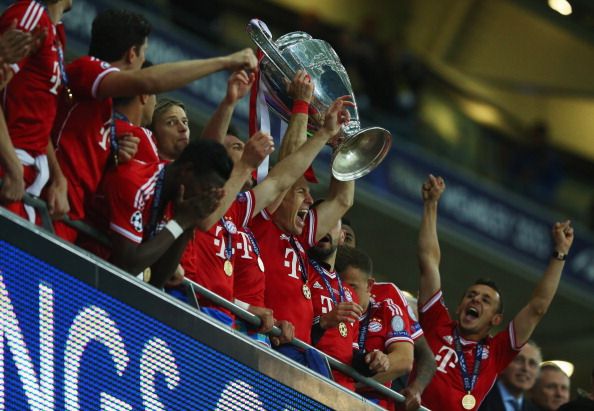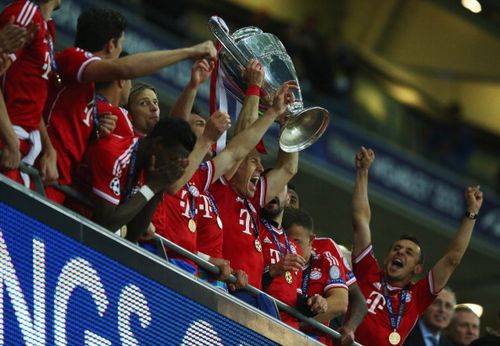
Bayern Munich's European success hides underlying economic structure issues

Bayern Munich are a superb football team. They play wonderful football and have put the disappointments of last season behind them admirably. They have shown great mental strength, they have great physical fitness, they press with coherence and discipline and when they get the ball they can be devastating. Their 7-0 deconstruction of Barcelona over two legs of the Champions League semi-final will be one of the indelible moments of football history. They were thoroughly deserving winners. And yet, and yet…
It feels wrong to be writing this after a superb game played in a great atmosphere. Taken out of context, what happened at Wembley was a wonderful football occasion, the essence of what the game should be about: two teams of high quality attacking each other with gusto, with half the stadium bouncing in red and the other half baying in yellow. It was enjoyable and enthralling.
But it’s impossible to look at this out of context, and that context is of a mighty commercial juggernaut crushing all before it. Bayern’s wage bill is double that of Dortmund’s. They have already bought one of Dortmnd’s best players for next season and where Mario Gotze has already agreed to go, Robert Lewandowski may soon follow – certainly it was hard to interpret Jupp Heynckes’s comment that “he won’t be hanging around” in any other light. How can Dortmund hope to compete? They have already worked miracles to overcome the loss of Lucas Barrios, Nuri Sahin and Shinji Kagawa; it can’t last forever: one slip and their challenge is over, while Bayern, insulated by cash and an awesome squad, rumble on.
Bayern are not the first club with such financial might but they are part of a growing trend. The imbalances between rich and poor are becoming greater and greater. On the one hand, that concentration of resources at the top end of the game means that the quality of football played at the highest level is probably higher than ever before. But it also means that over the past five years, there have only been nine different Champions League semi-finalists (as opposed to 18 in the five years to 1986-87). Football is increasingly dominated by a small, self-perpetuating elite.
That is bad on a variety of levels: for one thing, it kills the dreams of a vast number of teams – and not just at European level; dominance in European competition means dominance at home – which is one of the reasons so many domestic leagues this season became one-horse races. And for another, it kills much of the human drama. Bayern’s defeats in the 2010 and 2012 finals become far less traumatic if their financial might means that another appearance in a final is almost inevitable. When reaching a final was a once in a generation feat, then those games were truly psychologically gripping; there is a danger they become just another in a sequence. Financial Fair Play is only going to ossify the existing power structure.
So huge credit to Bayern, worthy champions, but their success feels almost a minor issue beside the unease promoted by football’s underlying economic structure.